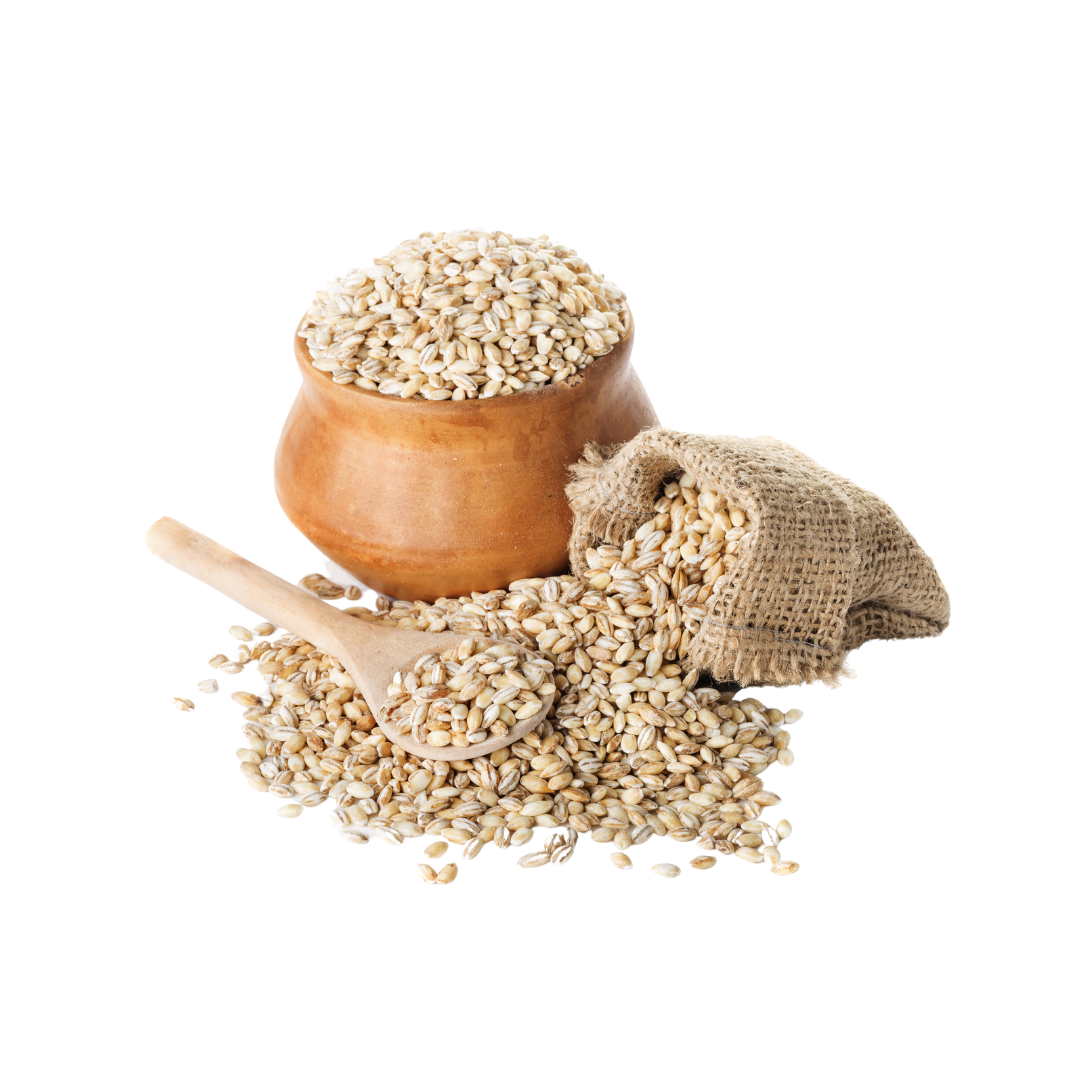
About
Barley is a cereal grain that belongs to the grass family Poaceae. It is commonly used in the production of beer, whiskey, animal feed, and in some cuisines as a source of fiber, protein, and nutrients.
Health benefits of Barley:
-
Improves Digestion: Barley is high in fiber, which aids digestion by adding bulk to the stool and promoting regularity.
-
Lowers Cholesterol: The beta-glucan fiber found in barley has been shown to reduce cholesterol levels by binding to bile acids in the gut, which helps eliminate them from the body.
-
Regulates Blood Sugar: Barley is a good source of complex carbohydrates, which release energy slowly and help regulate blood sugar levels.
-
Boosts Immunity: Barley is rich in antioxidants and immune-boosting nutrients, such as selenium and vitamin C, which can help protect against diseases and infections.
-
Promotes Heart Health: Barley contains high levels of dietary fiber, potassium, and magnesium, which are all beneficial for heart health. It also contains phytosterols, which can help reduce the risk of heart disease.
List of diseases that can be cured:
Barley is not a cure for any disease, but it can help improve overall health and reduce the risk of certain diseases. Some of the health conditions that may benefit from the consumption of barley include:
- High Cholesterol
- Diabetes
- Obesity
- Heart Disease
- Digestive Issues
Macro Nutrient content per 50g serving Of Barley:
| Nutrient | Amount |
|---|---|
| Carbohydrates | 34g |
| Protein | 5.6g |
| Fat | 0.6g |
| Fiber | 6g |
| Water | 3.2g |
Vitamin content per 50g serving Of Barley:
| Vitamin | Amount |
|---|---|
| Vitamin A | 0 IU |
| Vitamin B1 | 0.1 mg |
| Vitamin B2 | 0.1 mg |
| Vitamin B3 | 2.2 mg |
| Vitamin B6 | 0.2 mg |
| Vitamin B12 | 0 mcg |
| Vitamin C | 0 mg |
| Vitamin D | 0 IU |
| Vitamin E | 0.4 mg |
| Vitamin K | 2.4 mcg |
| Folate | 18.2 mcg |
| Biotin | 1.2 mcg |
Mineral content per 50g serving Of Barley:
| Mineral | Amount |
|---|---|
| Calcium | 13 mg |
| Iron | 1.2 mg |
| Iodine | 2.5 mcg |
| Zinc | 0.8 mg |
| Magnesium | 51.5 mg |
| Phosphorus | 118 mg |
| Potassium | 125 mg |
| Sodium | 2 mg |
| Chloride | 3.3 mg |
| Copper | 0.1 mg |
| Chromium | 0 mcg |
| Fluoride | 0 mcg |
| Molybdenum | 4.5 mcg |
| Manganese | 0.6 mg |
| Selenium | 4.4 mcg |
What is Barley?
Barley is a cereal grain that is used in various food and beverage products.
What are the nutritional benefits of Barley?
Barley is a good source of dietary fiber, protein, and several essential vitamins and minerals.
What are the health benefits of Barley?
Barley has been linked to several health benefits, including improved digestion, lower cholesterol levels, and better heart health.
How to cook Barley?
Barley can be cooked by boiling it in water or stock until it is tender.
What are the different types of Barley?
The different types of Barley include hulled, pearled, and quick-cooking Barley.
What is Barley tea?
Barley tea is a caffeine-free tea that is made by steeping roasted Barley grains in hot water.
How to make Barley soup?
Barley soup can be made by simmering Barley grains in a broth or stock with vegetables and seasonings.
What is Barley grass?
Barley grass is the young, green shoots of the Barley plant that are often used in health supplements.
How to use Barley for weight loss?
Barley can aid in weight loss by promoting feelings of fullness and reducing appetite.
What are the benefits of Barley water?
Barley water is a low-calorie beverage that can help with hydration and may have additional health benefits.
How to make Barley cereal?
Barley cereal can be made by cooking Barley flakes or rolled Barley with milk or water and sweeteners.
What are the benefits of Barley for digestion?
Barley is a good source of fiber and prebiotics, which can promote healthy digestion and bowel regularity.
How to use Barley for arthritis?
Barley may help reduce inflammation and pain associated with arthritis when consumed regularly.








